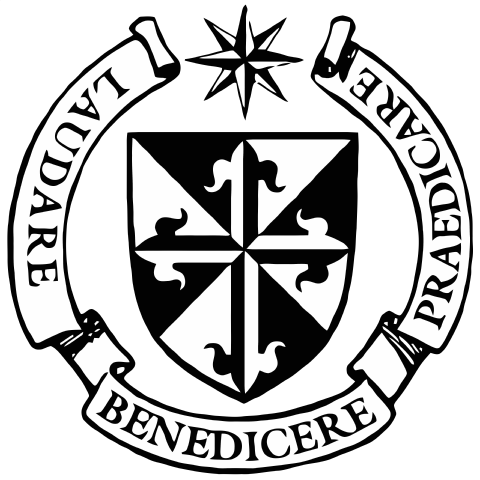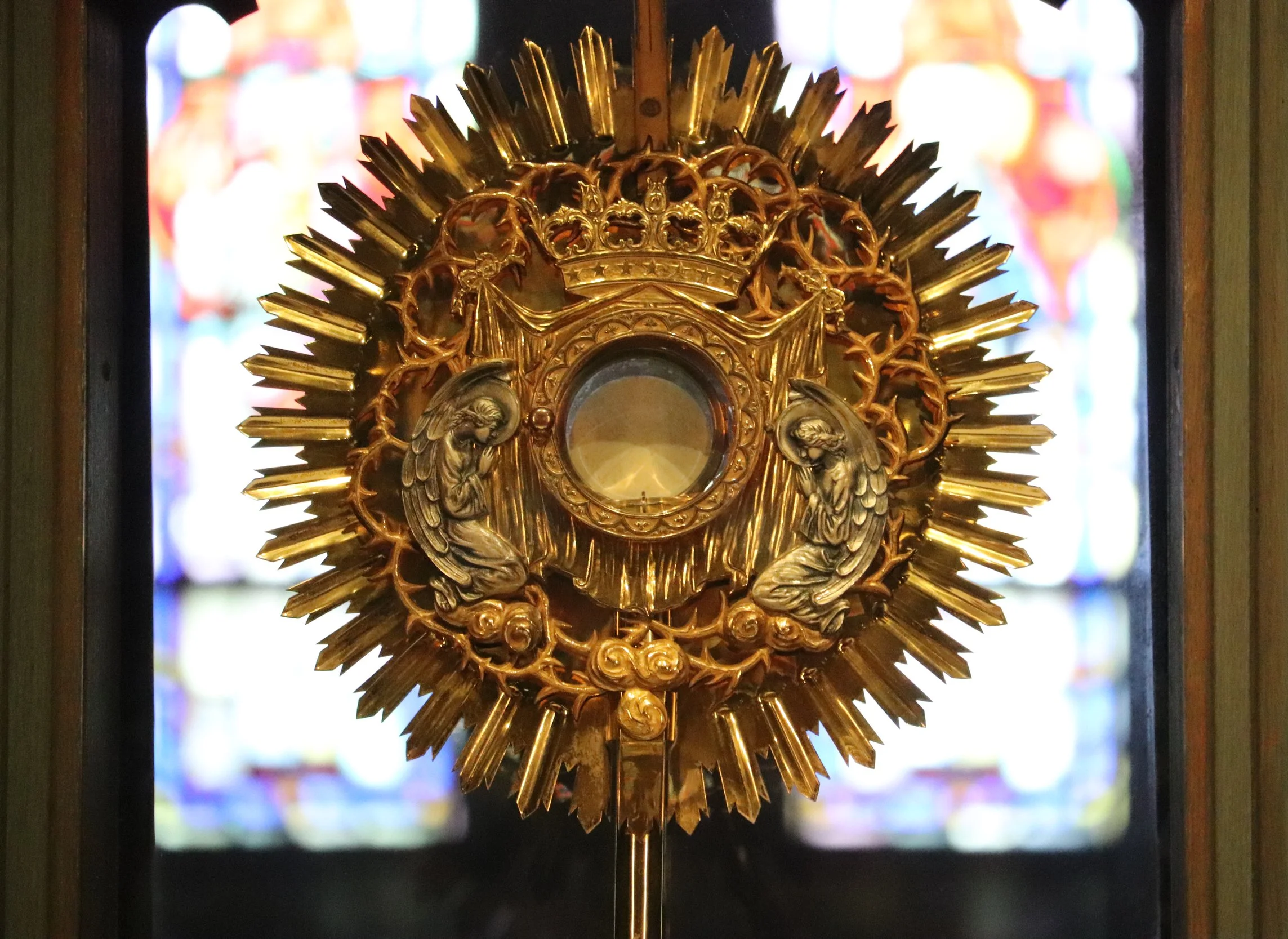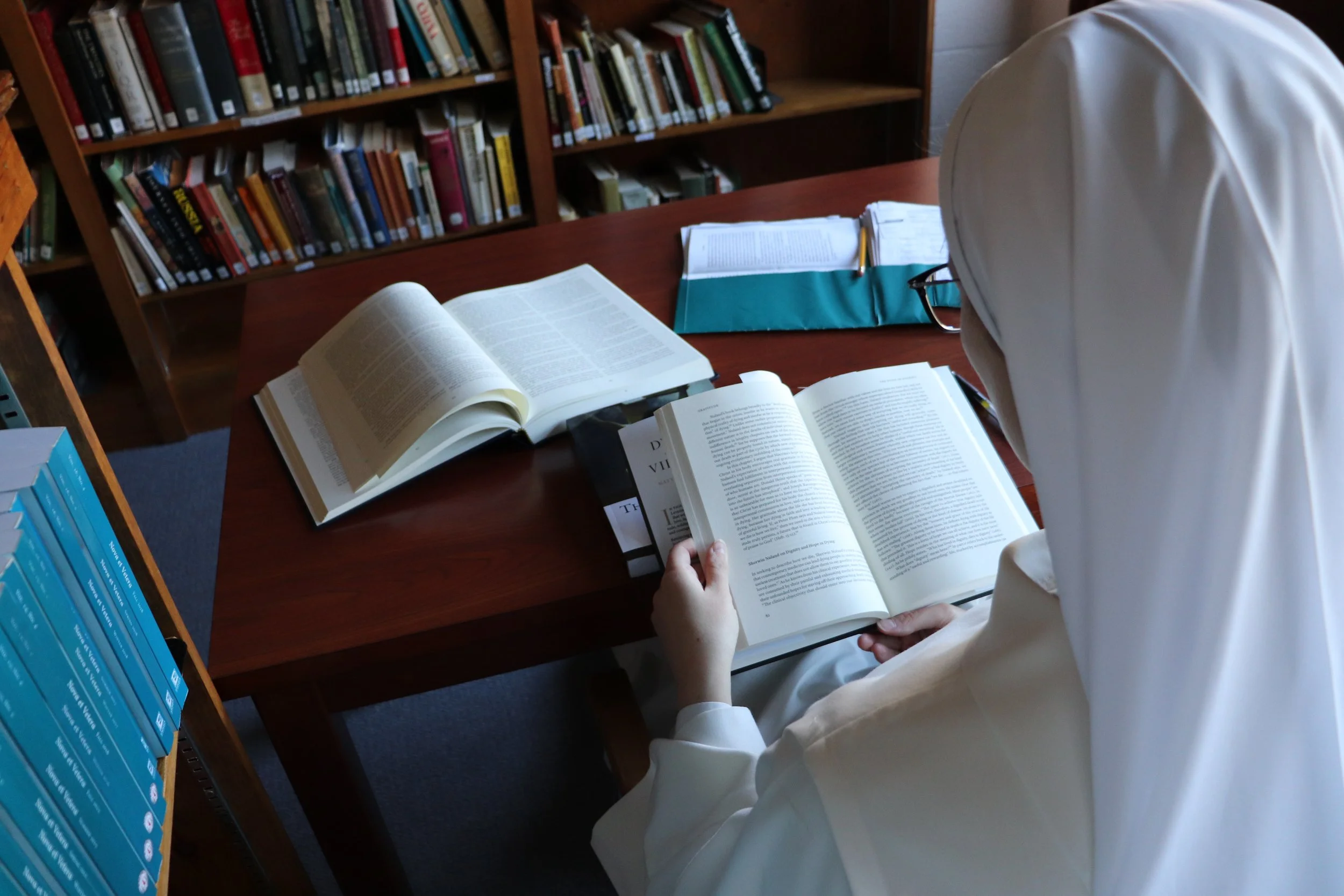
Contemplative Life
“To seek, ponder and call upon him in solitude…”
The contemplative life is a life of profound union with God; it begins at Baptism, when the Divine Persons begin to dwell in the soul of the Christian. This indwelling of the Father, Son, and Holy Spirit draws one into the very life of God through the theological virtues of faith, hope, and charity.
Through these virtues, a person comes to know and love God as he knows and loves himself. The fullness of this contemplative life will only be arrived at in the beatific vision in Heaven. But, even on earth, we experience a foretaste of this union with God for which we were created.
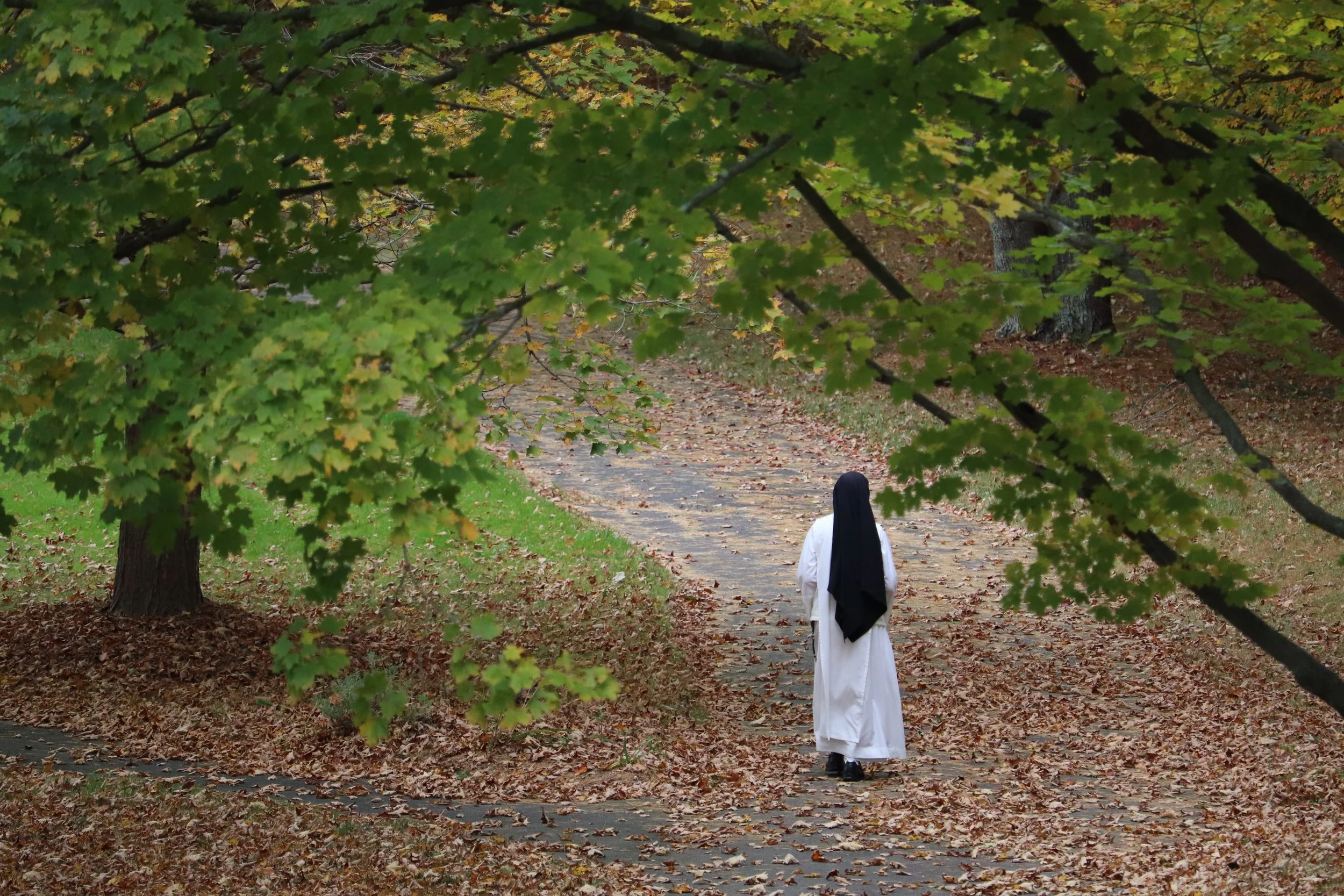
“Whoever loves me will keep my word,
and my Father will love him,
and we will come to him
and make our dwelling with him.”
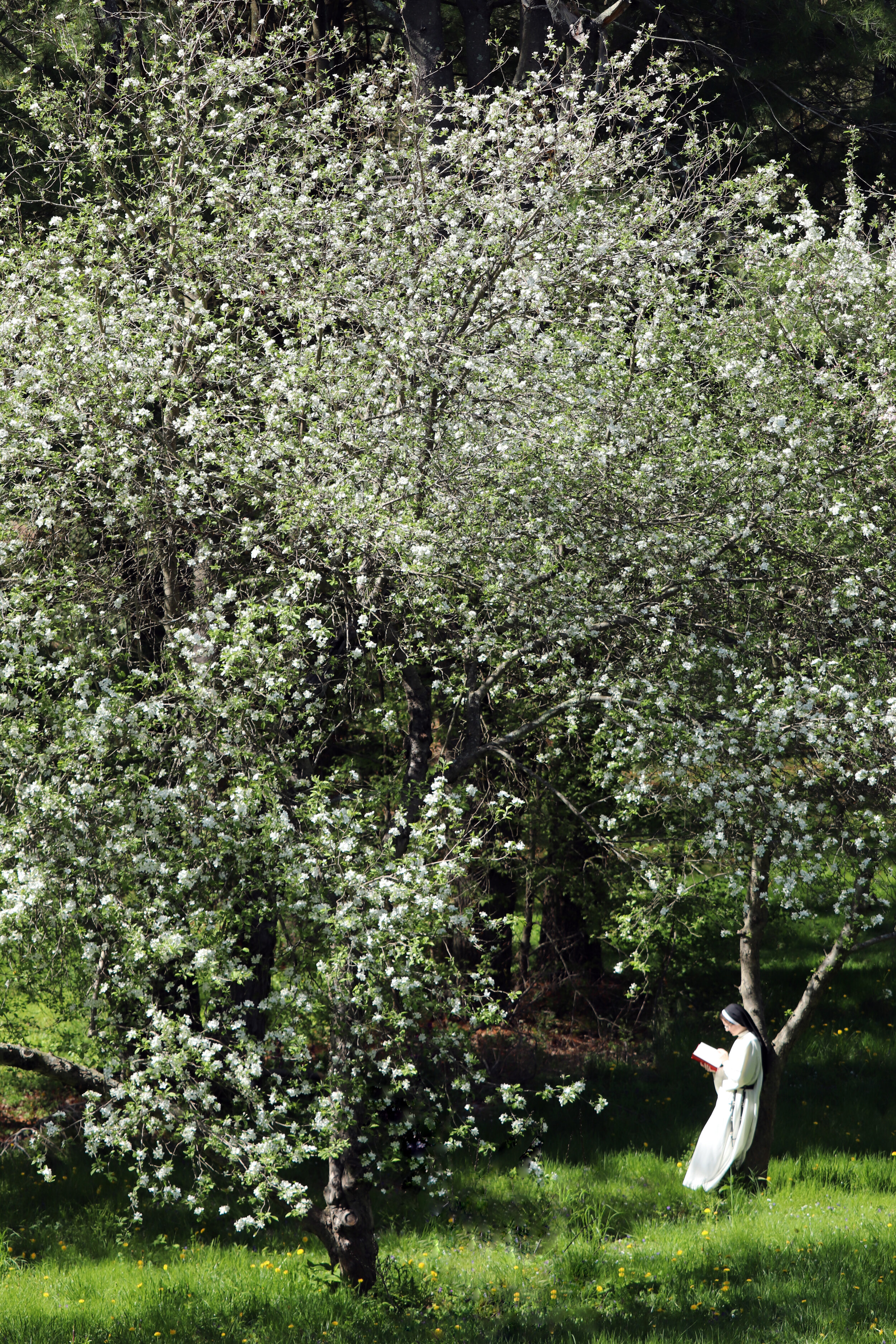
Contemplation
The contemplative life is ordered to union with God. It is “the normal life of grace” for the Christian. The simple act of gazing on truth, the intellect's natural form of contemplation, becomes something supernatural in the sons and daughters of God who are introduced into God's own trinitarian life at Baptism.
Christian contemplation thus presupposes relationship: the relations of Father, Son, and Holy Spirit are the ground of origin for our contemplative union with God. By grace, it is possible for us to know and love God as he knows and loves himself. This is how what is “normal” for God also becomes “the normal life of grace” in us. And this is truly extraordinary.
The contemplative life refers to that specific state of life freely chosen by individuals within the Church and canonically distinguished by its total ordering to contemplation. Men and women called to contemplative life remain at the very heart of the Church following Christ's command to “remain in my love.” They are conformed to the self-sacrificing love of Christ by reverent participation in the Sacrifice of the Mass, Divine Office, and Eucharistic Adoration. They are nourished in their devotion to Christ by private prayer and lectio divina.
Contemplative union with God is the goal of all that contemplatives do—their piety, work, prayer and sacrifice—but it also remains a gift to be received, one that God grants to whom he wills as he wills. The life of contemplation is, in this sense, a constant appeal for God's visitation: Come, Lord Jesus! It is a life of faith, hope, and charity that anticipates already the perfect happiness of heaven.
What characterizes a contemplative nun as Dominican, is a radical receptivity to the Word which is fostered, communicated, and lived through particular observances. This receptivity is described in the Fundamental Constitutions of the Nuns, “The nuns are to seek, ponder and call upon him in solitude so that the word proceeding from the mouth of God may not return to Him empty, but may accomplish those things for which it was sent (cf. Is. 55:10)” In the Dominican nun’s ardent pursuit of this contemplative union with God, four principle observances guide her, namely, the common life, liturgical and private prayer, study, and the evangelical counsels. A nun’s maturity in the life is in proportion to the degree that these observances are integrated into a unity, a form of life that draws her ever more deeply into the life of God.
Liturgy
The Liturgy is the focal point of Dominican life. It is our communal intercession and praising of God which provides the structure of each day. Seven times every day we come together in the chapel to chant the Liturgy of the Hours, also called the Divine Office. The names of the individual hours are: Lauds (Morning Prayer) Terce, Sext, None, Vespers (Evening Prayer) Matins, and Compline. When we pray the Liturgy of the Hours we participate in the fundamental action of the Church in praising God, historically referred to as the Opus Dei, the work of God. Furthermore, praying these hours throughout the day is meant to sanctify the whole day with ceaseless prayer which spills over into everything that we do in between each visit to the chapel, enabling all our work, study, and even our recreation to become a prayer.
The apex of this daily worship is the Mass. No prayer gives greater glory to God, is more sanctifying, or is more efficacious in interceding for others, than the Holy Sacrifice of the Mass, by which we offer to God the perfect sacrifice of his Son, Our Lord, Jesus Christ. Our worship of God, as the Preface of the Mass says, is “our duty and our salvation,” by which we not only give God his due, but by which we are sanctified. The liturgy, as well as giving rhythm to every day, gives shape to the entire year. With every liturgical season and solemnity, we relive and ponder the mysteries of Christ’s life and his Church. Similarly, the liturgical celebrations of the saints provide us a beautiful example of lives conformed to Christ, with special attention given to our own saintly Dominican brothers and sisters.
The divine praise – through the consideration of created things – goes straight to God: it fixes our attention firmly on the supreme object of our prayer. It is God that we are concerned with….(Clerissac)
The solemn celebration of the liturgy is the heart of our whole life and the chief source of its unity. (LCM - The Constitutions of the Nuns of the Order of Preachers)
In the liturgy the mystery of salvation is present and at work, especially in the Eucharist, in which Christ is received, the memory of his passion is recalled, the soul is filled with grace and a pledge of future glory is given. Appointed for the work of divine praise, the nuns, in union with Christ, glorify God for the eternal purpose of his will and the marvelous dispensation of grace. They intercede with the Father of mercies for the universal Church as well as for the needs and salvation of the whole world. This joyful celebration joins the pilgrim Church to the Church in glory. Hence the solemn celebration of the liturgy is the heart of our whole life and the chief source of its unity. (LCM)
The nuns offer a sacrifice of praise to God especially through the celebration of the liturgy in imitation of the Church in Jerusalem which was drawn together by the teaching of the Apostles and united in daily prayer (cf. Acts 2:42). Persevering in prayer with Mary the Mother of Jesus, they ardently long for the fullness of the Holy Spirit, so that with unveiled face they may reflect the glory of the Lord and be transformed into his image from splendor to splendor by the Spirit of the Lord (cf 2 Cor. 3:18). (LCM)
Private Prayer/Lectio Divina
The first disciples of Jesus witnessed him joining in the common prayer of the synagogue and Temple but they also often saw him going off by himself to pray to the Father in secret. They asked him to teach them to pray as John the Baptist had taught his disciples. When Jesus taught his disciples to pray he gave them the Our Father and in this way invited them and us into his own filial prayer. After his Passion, Death and Resurrection he sent the Holy Spirit upon Mary and the Apostles gathered in prayer, the same Spirit who had come upon Mary at the Annunciation, who moved John the Baptist to leap for joy in his mother’s womb and through whom Jesus offered himself to the Father for the life of the world. Jesus, through the Holy Spirit, continues to teach his disciples, including Dominican nuns, to pray and to offer ourselves with him to the Father. Thus, there is nothing especially unique about the “private prayer” of the Dominican nun. Increased intimacy with Jesus through a Eucharistic life conforms her to her friend, the Bridegroom, her heart and mind drawn into an ever deeper participation in his own perspective and desires. Her prayer in secret becomes increasingly one with his. The Dominican nun, too, is taught by the Spirit, formed by the Word of God, and shaped in a most particular way by the observances of Dominican monastic life, to continue the cry of her holy father Dominic, “my God, my mercy, what will become of sinners.”
The life of prayer finds its proper nourishment and safeguard in a continual pondering of the Sacred Scriptures read within the tradition of the Church. Lectio divina, or divine reading, is one of the oldest monastic practices, and is even prefigured in Israel’s prophets who were set apart to receive the Word of God. This Jewish tradition reaches its climax in the last and greatest of the prophets—Saint John the Baptist who dwelt in the desert and prepared a way for the Incarnate Word. Our Constitutions acknowledge John as a model and thus writes, “The nuns after the example of the Precursor, should prepare the way of the Lord in the desert…”
“Tireless in prayer (cf. Lk. 18:1), the nuns should have their hearts centered on the Lord. In addition to liturgical prayer, let them persevere fervently and earnestly in private prayer, so dear to our holy Father Dominic and the first brothers and sisters of the Order. “ (LCM)
“Following the example of Saint Dominic, who always carried about with him the gospel of Matthew and the epistles of Paul and almost knew them by heart, the nuns should above all keep the Sacred Scriptures at hand. They should ponder them deeply, so that like our blessed Father, they may pass easily from reading to prayer, from prayer to meditation, and from meditation to contemplation.” (LCM)
“By shunning the cares and illusions of the world (cf. Mt. 13:22), the nuns allow the seed which is the word of God to grow in their hearts by the power of the Holy Spirit; in so receiving it they are interiorly renewed and more closely conformed to Christ” ( LCM)
Study
There are many ways to collect information today, but few ways to discern truth. More than ever, souls in search of God need that virtuous habit of paying attention to what is truly known as study. Study holds a unique place in the Christian faith: it leads us to Jesus Christ, the Word made flesh, who is Truth himself. In this mode of encounter with Christ, study is both life-giving and life-changing. That is why it belongs at the heart of Dominican life.
The Dominican nun also belongs at this living heart. But, study for the Dominican nun is not simply a matter of cultivating the virtue of studiousness or applying her mind to speculative subjects. Rather, it is intended to facilitate a real contact of her intellect with sacred truth, which is why the principle object of her study is sacra doctrina, or theology. Study, for her, is an apprenticeship in holy wisdom.
Its regular discipline orders her intellect and purifies her will, disposing her for the elevation of grace. As an ascetical practice, study teaches her to think and act according to the truth of things—the natural truths written into creation, history, and philosophy and the supernatural truths written into sacred scripture and tradition. Sending down her roots into doctrine divinely revealed, the Dominican nun is raised to contemplation of God.
For this reason, monastic study is never a matter of private diversion. For the Dominican nun, it is part of a public vocation within the Church and, as such, reflects the theological reality of her person: Consecrated to God, she tends toward him. Living the evangelical counsels, she enters into eternal perspectives. Studying truth, she encounters Christ.
As it has been practiced by Dominicans through the centuries, study is a natural preparation for supernatural life. Her faith is deepened, her hope and charity are increased as she ponders God and his mysteries. Gradually, her intellect is anchored to the mysteries through this holy observance, and she enters into these sacred realities, present in the liturgy in Word and Sacrament, to worship in Spirit and in Truth.
-
Classes during the first years in the monastery are ordered to assisting the young woman aspiring to become a Dominican nun to understand the life of observance within the monastery. Initial Formation Courses include:
Christian Doctrine
Scripture
The Liturgy
Monastic History and Sources
Dominican History and Sources
The Vows and Religious Consecration
The Rule and Constitutions
Theology of the Spiritual Life
History of Spirituality
Church History
-
Following profession of simple vows, the young nun participates in the four-year Theological Formation Program held in conjunction with the Pontifical Faculty of the Immaculate Conception at the Dominican House of Studies in Washington, D.C. The chief objectives of this program are the transmission of a coherent theological vision based on the writings of Saint Thomas Aquinas and the cultivation of habits of disciplined study integrated with the other essential elements of the Dominican contemplative life. Courses include:
Introduction to Philosophy
Introduction to Theology
Metaphysics
The Trinity
Creation, Law and Grace
Moral Theology
Christology
The Sacraments and Ecclesiology
-
The habit of study developed in the early phases of formation is exercised throughout the remainder of the life of a nun in her individual study; it is maintained through lectures and other opportunities offered by the ongoing formation provided for the whole community. Covid-19 prevented us from having any in-person lectures in 2020. Last years topics included:
“The Incarnation as a Manifestation of the Trinity” (Fr. Thomas Joseph White, O.P.);
“Happiness as a Common Good” (Fr. Gregory Pine, O.P.);
The Gospel of Saint Matthew (Fr. Isaac Augustine Morales, O.P.);
“The Virtue of Penance in Dominican Life” (Fr. Andrew Hofer, O.P.);
The Mariology of the Fathers (Fr. Andrew Hofer, O.P.).
In late 2021 we were able to resume in person lectures:
“Patristic Preaching” (Fr. Andrew Hofer, O.P.).
“Creation” (Fr. Timothy Bellamah, O.P.)
“Beatitudes” (Fr. Joseph Martin Hagan, O.P. - for our Annual Retreat)
“Saint Bernard” (Fr. Ignatius Schweitzer, O.P.)
Father Ignatius recently returned and got 2022 off to an elevating start with conferences on Saint John of the Cross which were followed by a lively exchange on the various schools of spirituality and how they intersect with our way of life as Dominicans. We look forward to having Fr. John Corbett, O.P. with us for our Jubilee Mass on May 14th and for lectures on “Virtue” for our postulants and resident aspirant; Fr. Hofer will return in August for lectures on Saint Augustine’s Confessions for the whole community.
“ The Dominican homage to God consists in the dedication of the intellect to supernatural truth.”
Adoration of the Blessed Sacrament
We adore Jesus in the Blessed Sacrament day and night. We praise and thank him unceasingly for his goodness and love which reaches out to us day by day and calls us into the intimacy of his divine life.
The more we experience his love the more we desire to live in that love and make it our own. United with Jesus we offer our lives and our prayers for the salvation of the world in unceasing prayer.
"... zeal in praying and consecrating one's self to God for the unity of the Church should be practiced particularly by religious, both men and women, inasmuch as they are in a special way devoted to the adoration of the Blessed Sacrament, according it homage and honor on earth, in virtue of their vows." Mysterium Fidei (The Mystery of Faith), Pope Saint Paul VI
Image: “The Vision of Saint Dominic,” Bernardo Cavallino, 1640. Public domain.
“The nuns should worship Christ in the mystery of the Eucharist so that from this wonderful exchange they may draw an increase of faith, hope and charity.”
